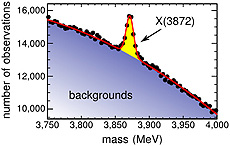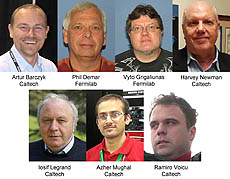CMS observes particle X
 |
| In a large sample of proton-proton collisions resulting in muons and pions, a few thousand of them accumulate above the backgrounds with a mass of 3,872 MeV. This is the X(3872). |
When the discovery of a new Higgs-like particle was announced last summer, it received a lot of well-deserved media attention. It is less widely known, however, that about a dozen new particles have been discovered in the past 10 years. Why all this lack of excitement? Unlike the Higgs boson, these other new particles are bound states of quarks: the same old particles in new combinations.
But they should not be so quickly dismissed. These new particles may be made of quarks, but most of them defy conventional explanations of how quarks fit together.
In the standard theory of quark interactions, quarks come in three types and can only bind together in ways that would result in an equal balance of these types. By analogy with the color wheel, they are called red, green and blue, and a particle like a proton is made of one red, one green and one blue quark, which mix to form white. Antiquarks are yellow, cyan and magenta. You can form a bound state from a yellow antiquark and a blue quark, for instance, since these colors are on opposite sides of the color wheel. See this "Physics in a Nutshell" for more.
Up to 2003, the only combinations of quarks and antiquarks that had ever been seen were red-green-blue particles, yellow-cyan-magenta antiparticles, and quark-antiquark pairs. Since then, a growing number of bound states have been discovered that do not fit this scheme. The first of these, discovered by the Belle experiment in Japan, was the X(3872), named "X" because we do not know what it is, and "3872" for its mass, measured in units of MeV.
The X(3872) and its companions might be the first examples of four-quark combinations, such as red-cyan-yellow-blue. These combinations are theoretically possible since they mix to form white, but they were not expected to be stable enough to be observed. The X(3872) in particular has a mass that is very close to the sum of two well-known bound states, D0 and D*0, so it might be a bound state of bound states. It has also been suggested that these new states are part-glueball hybrids.
In a recent experiment, CMS scientists observed the X(3872) with a strong signal (see the plot above) and measured several of its properties with higher precision than ever before. Far from the glare of the spotlight, these scientists are working to solve one of nature's underappreciated mysteries.
—Jim Pivarski
 |
| The 2011 X(3872) paper describes an analysis conducted primarily by physicists from non-U.S. institutions. These US CMS physicists contributed to an earlier version of the analysis. This earlier work was an important contribution to the result described here. |
 |
| US LHCNet provides international connectivity between CERN and remote high-level computer centers in the United States, allowing the LHC data to be distributed, processed and analyzed at distant locations. In the United States, the main remote centers are at the Fermilab and Brookhaven laboratories, complemented by many university-based facilities. This network serves not only CMS, but the entire LHC community. These physicists, computing and network professionals are responsible for the reliable operation of this crucial component of the LHC program. |
|